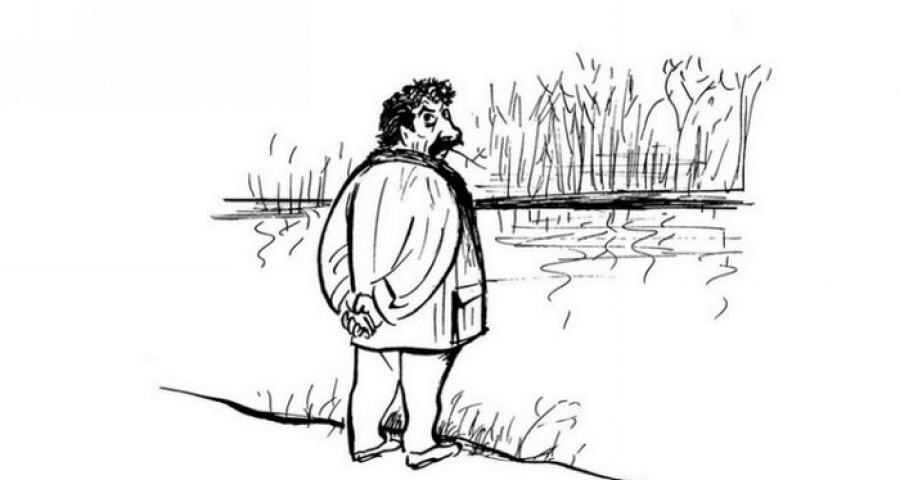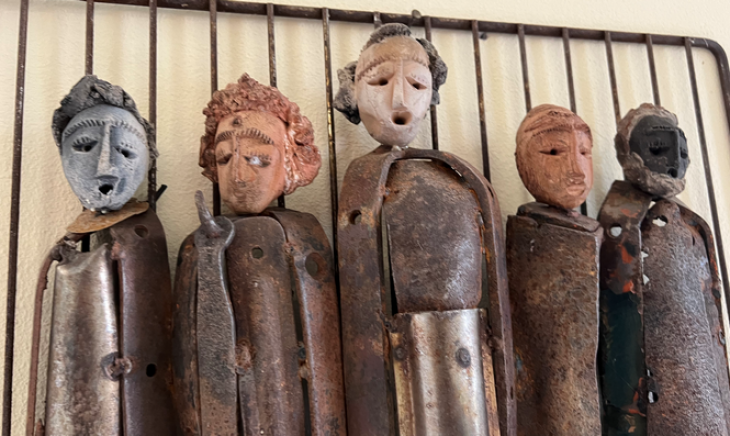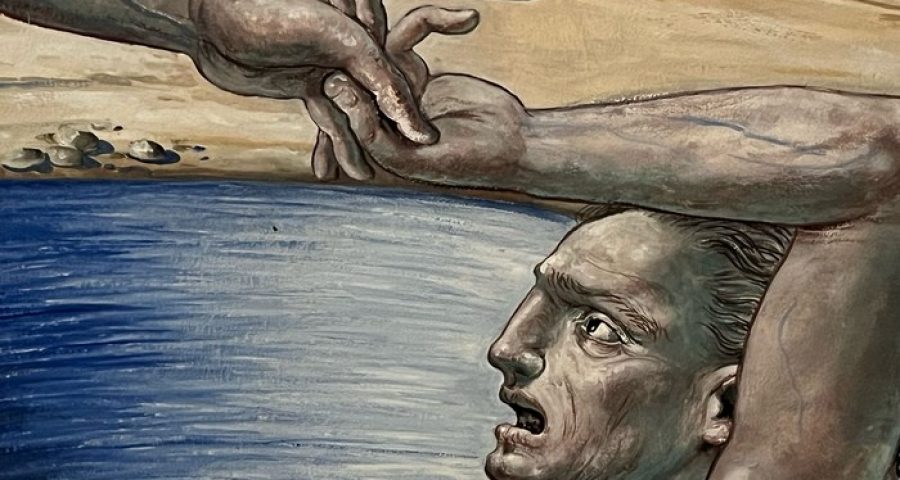Narrative economy/8 - A non-conformist critic of everything that appears fake, the writer has given voice to immortal characters. And to a Jesus who moves us
by Luigino Bruni
published in Avvenire on 01/12/2024
«I remember a sunset driving along a road in Calabria. We were unsure of our route and it was a great relief to meet an old shepherd. He got into the car with some diffidence, because now, from the window he always looked out of, he had lost sight of the bell tower of Marcellinara. For that vanished bell tower, the poor old man felt completely bewildered. We then rushed him back: and always he stood with his head out of the window, scanning the horizon, to see Marcellinara's bell tower reappear»
Ernesto De Martino, La fine del mondo, 2002
After Silone and Levi, some articles on Guareschi's ‘Mondo Piccolo’ begin, another great look at the popular world of yesterday, and its soul.
Mondo piccolo. This is the world narrated by Guareschi, that ‘slice of plain that lies between the Po and the Apennines’ (Mondo Piccolo. Don Camillo, 1948, p. xi). A very small world, too small for us, but certainly a world that still fascinates us, calls us, questions us in a time when the world has become big, very big, certainly too big to be comfortable in it without suffering the anguish of ‘being lost’. Disorientation is the great anthropological and spiritual note of the third millennium - we have globalised the world, we have torn down all the bell towers, and we are losing ourselves. Don Camillo and Peppone have many faults, some virtues, but they are not bewildered: they live under the same symbolic bell tower.
Mondo piccolo was born at the end of 1946, and for some twenty years more than three hundred episodes cheered the world - in the 1953 edition of ‘Mondo Piccolo. Don Camillo e il suo gregge', Rizzoli indicated 27 countries where Don Camillo had been translated. It is Guareschi himself who recounts that providential birth: ‘’Why do you always reduce yourself to the very last minute? I have never regretted in my life having done the next day what I could have done today... I remember it, the eve of Christmas 1946. Because of the festivities, work had to be finished earlier than usual... Then, as well as compiling Candido, I was writing short stories for Oggi: it was already evening and I still hadn't written the piece that was missing to complete the last page of my paper.... ‘Candido must be closed immediately! So I took a small piece out of ‘Today’, put it together in a larger font and threw it into Candide. ... If I had listened to the ‘officials’ and prepared my work in time, Don Camillo, Peppone and the other merchandise of Mondo Piccolo would have been born and died on Christmas Eve 1946... And instead, joking, joking, joking, two hours ago I delivered (at the very last moment and to the disgust of the ‘officials’) the 200th episode of Mondo Piccolo. (Don Camillo and His Flock, 1953, pp. xii-xiii).
Giovannino Guareschi (1908-1968) is one of the few classics of popular literature, and the adjective ‘popular’ amplifies the noun. In Italy, his life and work were very troubled. He was born in Fontanelle (Parma), a village in the Bassa. The son of a schoolteacher and a bicycle dealer: ‘When I was a boy, I often sat on the bank of the great river and said: ’who knows if, when I grow up, I will be able to cross to the other bank! ... Now I'm forty-five years old and I often go and sit on the bank of the big river as I did then, and while I'm chewing a blade of grass, I think: ‘it's nice here, on this bank’’ (Don Camillo and his flock, p. xiv).
He soon began working as a cartoonist and reporter. In 1942, he was arrested for saying outrageous words towards Fascism and Mussolini. On 9 September 1943, he was taken prisoner by the Germans, then interned in various camps in Germany and Poland until September 1945. This is how he recounts that decisive experience: ‘I found myself embroiled in this war as an Italian ally of the Germans at the beginning and as an Italian prisoner of the Germans at the end. The Anglo-Americans bombed my house in 1943, and in 1945 they came to free me from captivity... As far as I am concerned, that is the whole story. A very banal story in which I had the weight of a hazelnut shell in the stormy ocean, and from which I emerge without ribbons and without medals but victorious because, in spite of everything and everyone, I managed to pass through this cataclysm without hating anyone. On the contrary, I managed to find a precious friend: myself' (Diario clandestino, 1949, p. ix). Words of an immense intensity and depth, which we would not expect from the author of Peppone and Don Camillo, because we have not read him carefully, and because, not knowing the Bible, we think that very deep speeches and humour cannot go together.
In the post-war period his public criticism continued, but not only against communism, as is widely (and too much) known. In fact, Guareschi was a radical and very severe critic of everything that appeared fake, false, ideological, conformist, hypocritical and opportunist to him. He was, in fact, much criticised by Togliatti (the ‘trinariciuto’), but it was a liberal and a Christian Democrat who condemned him. In 1950 he was sentenced for contempt to eight months' imprisonment (not served because he had no previous convictions) for a cartoon in Il Candido where he had criticised the mercantile use that Luigi Einaudi, then Head of State, had made of his institutional function to promote one of his wines - “Nebbiolo, il vino del Presidente”. Even more notorious is Alcide de Gasperi's lawsuit for having published, in 1954, two letters (later found to be false) in which de Gasperi asked the Allies to bomb Rome in 1944. He spent 409 days in prison in Parma, and did not want to appeal - ‘I accept the sentence as I would accept a punch in the face’, he said. He never recovered from this devastating experience. He increased his isolation. In 1957 he left the editorship of Il Candido, in 1961 he had his first heart attack; the second, in 1968, was fatal.
His was not a successful life, despite the enormous international success of his works. Instead, it was an existence punctuated by nasty and unfair criticism, marginalisation, his works being downgraded to laugh-out-loud stories, and him being derubricated to a macchiettista.
Guareschi never gave himself airs as a writer. He did not move in the literary circles that counted, he did not win the Nobel Prize (although in 1965 someone tried to nominate him): ‘In my vocabulary, I have no more than two hundred words... So no literature or other such merchandise’ (Don Camillo, p. ix). And yet, you only have to read his stories to realise that you are dealing with a great writer. He is so because he presents (at least) three talents that are only found in great and very great writers.
The first is the ability to capture the profound soul of a time and place. He has revealed to us the Bassa (at least) like Levi the Lucania and Silone the Marsica. But, more than Silone and Levi, Guareschi is truly inside his stories. He is inside many of Don Camillo's words and gestures, but also those of Peppone, Signora Cristina, or the Crucified Christ: ‘There are three main characters: the priest Don Camillo, the communist Peppone, and Christ Crucified. Well, here we need to explain ourselves: if the priests feel offended because of Don Camillo, they are perfectly free to break a stick over my head; if the communists feel offended because of Peppone, they are perfectly free to break a stick over my back. But if anyone else feels offended because of Christ's speeches, nothing doing; because the speaker in my stories is not Christ, but my Christ: that is, the voice of my conscience. My own personal stuff, my own internal affairs' (Don Camillo, pp. xxxvi-xxxvii).
The second talent is the gift (because it is not virtue: no talent is virtue) of not being trapped inside the steel cage of one's own temperament, one's own ideologies, beliefs and faiths, from which average and small writers do not free themselves. Guareschi, until the second before he wrote his stories and the second after he wrote them, was incapable of thinking the words of his characters. Especially in some stories, the words of Peppone, Don Camillo and Jesus are bigger, much bigger than Guareschi's words: ‘I have nothing more to say about Mondo Piccolo. No one can expect from a poor gentleman that after writing a book he should also understand it' (Don Camillo della Bassa, Introduction).
And so we come directly to the third talent, that which concerns the relationship between the writer and his creatures. Guareschi belongs to those few writers who are not the puppeteers of their characters: ‘Now it is not that I give myself the areas of the creator: I do not say I created them. I gave them a voice. The one who created them is Bassa. I met them, took them under my arm and made them walk up and down the alphabet' (Don Camillo e il suo gregge, p. xiv). At the beginning of Mondo piccolo it was Giovannino who led his protagonists by the arm; then it was Peppone and Don Camillo who led Guareschi by the arm, in stories, emotions, words that Giovannino neither knew nor imagined on that antivigilant day of 1946. Guareschi would not have baptised Peppone's son with the name ‘Lenin’, Don Camillo did (Don Camillo, p. 7); Guareschi would not have corrected the Italian of Peppone's speech, Guareschi did (p. 17); Guareschi would not have regretted writing ‘Peppone asino’, Don Camillo did (p. 12). Every great work is, for its readers, catharsis and half-noia; for its author it is, almost always, also resurrection.
Among the words that Guareschi probably did not want to write, but instead wrote, is the main and perhaps the most beautiful message of the book: Don Camillo and Peppone always quarrel, they even fight, they are different in everything, but... in the floods of the great river they go together along the bank to save the little village - we will see. Which is exactly what is missing in our politics and society today. And then we are also moved when we read from Guareschi: ‘And, at the end of 1951, when the great river burst its banks and flooded the happy fields of the Bassa and from foreign readers I received packages of blankets and clothing “for the people of Don Camillo and Peppone”, then I was moved’ (Don Camillo and his flock, p. xiv).
For all these reasons, I have decided to comment on Guareschi's Don Camillo. But the deeper reason is another. I was seduced by the dialogues between Camillo and Jesus. Peppone almost always appears with his companions and his family. Don Camillo is alone. His only companion is Christ, with whom he knows how to speak, to dialogue. That tiny world became infinite in those face-to-face, simply marvellous. Will we be able to talk to Jesus again?













